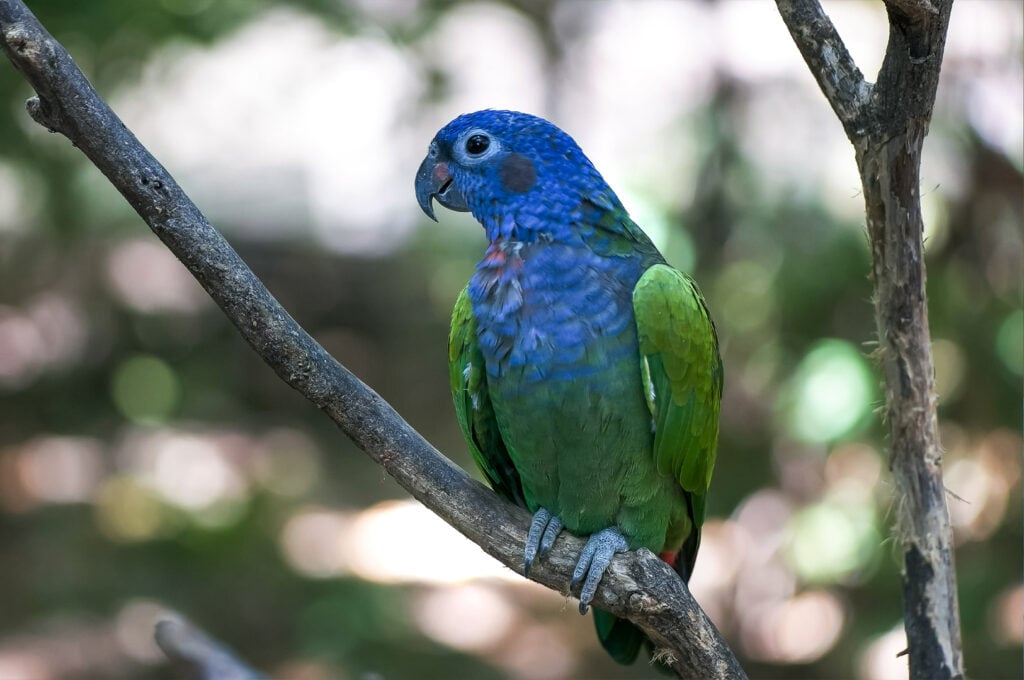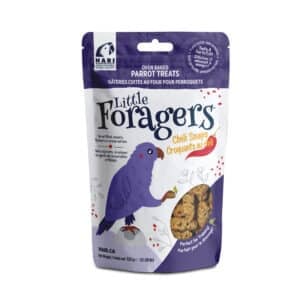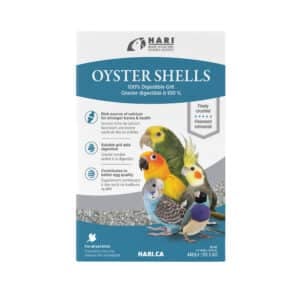Your cart is currently empty!
HARI Official Brand Site
Common Species
Blue-headed parrot (Pionus menstruus), White-crowned parrot (Pionus senilis), Bronze-winged parrot (Pionus chalcopterus), Dusky parrot (Pionus fuscus), Maximilian or Scaly-headed parrot (Pionus maximiliani)
Origin/Habitat
Pionus is a genus of medium-sized parrots native to Mexico, and Central and South America.
The Perfect Family Pet
Pionus Parrots are the perfect pet for families due to their relaxed and easygoing nature. Their gentle and loving disposition, along with their inquisitive and social nature make them easy to train and form a bond with their human family. Pionus Parrots are ideal for first-time bird owners and apartment dwellers due to their quiet, sweet, fun and easy-going nature. They can stay at home alone during the day without causing disruptions, but it is important to provide them with various toys and activities to keep them engaged and entertained due to their intelligence. While Pionus Parrots are not known for their talking ability, they can learn a few words. With their happy and affectionate demeanor, the Pionus Parrot is the perfect companion for individuals and families alike.
The family of Pionus Parrots is comprised of 7 distinct species, some of which are quite rare, and all belonging to the scientific genus Pionus, five of which are commonly seen as pets. These species are the Maximilian, White cap, Blue-headed, Bronze-winged, and Dusky.
The average lifespan of a Pionus parrot is about 20-25 years, although some (especially the larger species) have been known to live longer.
Physical Description
Pionus are medium sized, stocky parrots with square tails. They measure between 25 to 30 cm (10 to 12 inches). While all Pionus are roughly the same shape and size, the colour of the species are very different. The colours in a Pionus tend to be subtle but are beautiful. The one similarity in coloring for all the Pionus species is the red underneath their tails (under tail-coverts).


All Pionus have small bare eye rings and a prominent bare cere (nose) and have a naturally sweet, musty smell that many Pionus find pleasing.
Health Booklet
Keeping track of bird health by recording their growth, development, behavior and environment in a booklet can help ensure that your companion parrot will be healthy and happy for many years to come.
Sex
DNA sexing is the most accurate way to determine the sex of Pionus. Much like many of our other parrot species, a DNA blood test performed by a qualified experienced avian practitioner is also a good tool to determine sex of the bird.

Personality Traits & Behaviours
Pionus are a bit shy by nature, not bold and clownish like amazons or conures. They are very sweet, gentle, and sensitive birds. While Pionus are very good at staying home alone during the day, it is important to provide them with lots of different toys with which to amuse themselves. Pionus do not have strong beaks and therefore do well with toys made of soft wood, leather, and rope. It is important to keep your Pionus active as they tend to become overweight.

Noise Level/Speech/Song
Pionus are usually described as quiet birds which is true if you keep in mind that quiet is a relative term when it comes to parrots. A Pionus will never scream as loud as a cockatoo or macaw and generally will not scream for very long or very often. While Pionus are not known for their talking ability most will learn to say a few words. Some Pionus have clear voices while others do not. Talking ability in Pionus seems to vary greatly with individual birds.

Intelligence & Learning
Pionus may seem a bit standoffish and quiet the first time you bring them home. They simply need some time to adjust to their new environment and feel secure. These parrots are intelligent to the point of being able to mimic certain sounds and behaviours. It is important to stimulate their brain to encourage talking or else they might simply make sounds. Pionus can communicate their mood through their body language.

Threats/Conservation
Some population of species of Pionus are decreasing, however according to IUCN Red List of Threatened Species, Pionus are evaluated with a lower risk of extinction.

Relationship with Humans
Pionus birds are wonderful pets for families, but it’s important to supervise them around children. When these birds feel threatened, they may try to flee, bite, or freeze in place. Although Pionus birds enjoy human interaction and physical affection, they may not prefer cuddling. It’s worth noting that Pionus birds have a distinctive stress response – when frightened or over excited, they will wheeze as if having an asthma attack. However, the wheezing stops once the source of fear has retreated.
Care
The general rule of thumb when buying a bird cage is to buy the largest cage you can afford. For optimum health and safety, the cage should be at least two and a half times the width of the bird’s wingspan in all directions. Cage bar spacing should never be so wide that your bird could stick their head through, and their tail feathers should not be able to touch the bars when they are perched comfortably. Also consider your bird’s beak strength to determine the proper gauge of the bars as some birds have been known to bend the bars and escape.
A rectangular cage with horizontal bars in which your bird has plenty of room to climb and play is the best environment for your parrot. Your parrot will be happiest in a well-ventilated room with as much natural light as possible, yet away from direct sunlight and drafts. Your bird will want to be part of the action but not right in the middle of it. Avoid placing your bird’s cage in the kitchen as there are many hazards including vapors from heated PTFE coated pans (PTFE is better known as TeflonTM), hot stoves, pots of boiling water, and cooking fumes, all of which can be very harmful to your bird. The cage and accessories should be thoroughly cleaned and disinfected weekly. Make sure your bird stays healthy by providing them with fresh food and water every day. Don’t forget to wash their dishes daily!
Time out of the cage every day for socialization and exercise is important. Parrots enjoy supervised activities on a play gym loaded with their favorite toys and enrichment food. Make sure they do not have access to open doors or windows, toilets with the lid up, hot stoves, moving ceiling fans, or large panes of glass. It’s also a good idea to ensure they do not chew on or ingest anything unsafe such as treated or painted wood or unsafe house plants. Do not keep your bird in a room where sprays such as perfume, hair spray, air fresheners, or aerosol sprays are used frequently.
For the safety of your beloved parrot, we advise against leaving them unattended with other pets like dogs, cats, or ferrets.
When it comes to feeding your Pionus parrot there are countless opinions to consider. Here’s what we believe: a high-quality extruded diet – such as Tropican – serves as the foundation of your parrot’s diet, while other healthy enrichment foods provide welcome variety.
Pelleted bird food is the ideal source of nutrition to keep your parrot healthy. However, it’s important to offer variety, too, gourmet seeds, dried fruits, vegetables, and nuts (such as Tropimix), beans, and fresh fruits and vegetables all provide essential nutrients and diversity to your parrot’s diet. Sensible, healthy table foods such as cooked pasta, rice, hard-boiled eggs, multigrain toast, and unsalted crackers can also serve as treats in small amounts.
It is crucial to avoid unhealthy people foods. Never feed your parrot chocolate, alcohol, caffeine beverages, or avocado as even small amounts can be toxic. Salty or sugary foods should also be avoided. Check out our feeding recommendations for most parrot species.
Of course, fresh water every day is very important too. Remember to wash and refill your parrot’s water bowl daily to keep your bird healthy and happy.
Many bird owners will cover the bird cage at night to help block out extra light and to provide a sense of security. A cover can also keep the cage warmer (for those living in colder climates).
Your bird’s sleep cage should be outfitted with a comfortable perch placed at the highest level possible to provide security and maintain healthy feet. If your bird is prone to night terrors or you don’t use a cage cover, consider installing an infrared basking light or small night light in the room. Keep in mind that parrots need 10-12 hours of uninterrupted sleep for optimal health.
It’s important to maintain clean and appropriately sized perches to prevent Pododermatitis or Bumblefoot in your bird. Offer your bird at least three types of perches, such as cotton or sisal rope and natural wood perches. Remember to vary the diameter and size of the perches to fit your bird’s feet. Additionally, consider adding natural branches to the cage for perching and chewing. Opt for branches like willow, alder, ash, birch, or apple, but replace them every 4-6 weeks and remove the leaves.
Always keep your bird safe and comfortable by keeping their perches clean. Regularly inspect cotton or sisal rope perches for any signs of fraying or loose strands, and replace perches as needed due to normal wear and tear. If you use a grooming perch, place it on a lower level of the cage and away from food and water dishes.
Pionus love toys! To keep your Pionus occupied, make sure he has at least three toys of varying types – such as wood for chewing, rope or leather for preening, a bell or a swing – in his cage at all times. To avoid boredom, switch out the toys with new ones every week or two. If you’re unsure which toys are suitable for your Pionus, consider Smart.Play and Active.Play toys, which provide recommendations based on their size and needs.
Consistent positive behavior training is a great way to bond with your Pionus parrot. It’s best to start training as early as possible and begin with basic commands, such as “step up” and “step down”. Use positive reinforcement techniques and praise to encourage good behavior. Training your bird on a stand with a favorite treat is an excellent way to utilize time away from their main cage.
Introducing your parrot to new situations is key in preventing fear and aggression towards strangers. Socialize your parrot by exposing them to different people, environments, toys, and foods. The more varied experiences your parrot has, the more comfortable and well-adjusted they will be.
Daily bathing is essential to the health of your bird. Bathing moisturizes nasal passages and feet and keeps your birds’ feathers and skin in excellent shape. Pionus parrots will often bathe on their own if opportunity is available. If your bird is reluctant to bathe on his own, you can use a spray bottle with warm water to gently mist him or use a shower perch. Be sure to remove seeds or pellets from the cage before misting as damp food can grow mold and bacteria. Always bathe your bird early in the day and let him dry naturally in a draft free area.
While it’s up to you whether or not to trim your parrot’s flight feathers, many owners opt to do so. Trimming is a painless process, similar to a regular haircut, and should be done twice a year during the bird’s moulting period. Regular toenail inspections and grooming are also necessary. It’s important to have a professional bird groomer handle the trimming of your bird’s nails and wings to avoid accidentally cutting a blood feather if you’re not experienced. Keep in mind that trimming wings is not a guaranteed way to prevent flight, as even one or two grown-in feathers can give your bird flight ability. Therefore, never take your bird outside unless they are in a secure cage or wearing a properly fitted bird harness.
It is important to provide parrots with a safe environment to ensure the longest lifespan. The following is a list of common household dangers: Non-stick surfaces (like TeflonTM coated pans), oven cleaners and self-cleaning ovens, cigarette smoke, paint and paint fumes, scented candles, household cleaners, floor polish, hairspray, chlorine bleach, perfume, aerosol sprays, nail polish and nail polish remover fumes and ingesting harmful or toxic house plants. It’s important to make sure everyone in the household is aware of food and other products in the home that are potentially toxic to parrots, such as avocados, chocolate, coffee beans, onions, salt, and fruit seeds or pits. Ceiling fans, cupboards, blinds, and open doors and windows can also pose a risk as your pet may fly into, get trapped or simply fly away.
Birds tend to conceal signs of illness, making it crucial to be observant and note any subtle changes in your bird’s health or behavior. For Pionus parrots, it is recommended to visit an avian vet or exotic pet specialist at least once a year for a comprehensive evaluation and preventive health care plan. When searching for a vet, look for one who specializes in bird and/or exotic pet species. Some clinics can perform routine bird appointments but will refer you to a certified avian vet for more complex cases. An avian vet can provide valuable advice on appropriate health care for your bird.
Availability in the Pet Market
Most Pionus parrots can be obtained from an avian specialty shop, pet dealer, or a reputable breeder. Online adoption organizations and rescues can also be a viable option for those looking to adopt a Pionus Parrot.
… Because of their sweet nature, Pionus parrots make great pets for easy going families especially for apartment dwellers.

Aviculture
Breeding Habits
Pionus Parrots in the wild typically breed once a year, but the specific time frame varies by the species and geographic location. A clutch generally consists of 3-4 eggs. In an aviary setting, many Pionus species will breed in late spring or occasionally in the fall, with an average clutch size of four eggs. Pionus parrots typically reach maturity between the ages of 3-4 years.
Hatchling to Fledgling
Most aviculturists catering to the pet bird trade prefer to have parent birds raise their young for about two to three weeks before beginning hand-feeding. Breeding parrots should be in optimal health and receive proper nutrition to support the needs of both the “expectant” parents and the nestlings. Tropican High Performance 2mm, 4mm, 8mm, Sticks and Tropimix Small and Large Parrot are excellent options, as well as vegetables and fruits high in beta-carotene to meet the nutritional needs of breeding parrots. Adding Prime Vitamins to the diet can also benefit breeding pairs on a predominately seed-based diet.
Suggested Products

Smart.Play
Roper Orbiter Perch n Swing, Large, Enrichment Parrot Toy for Medium to Large Birds
Enrichment Parrot Toy for Medium to Large Birds





